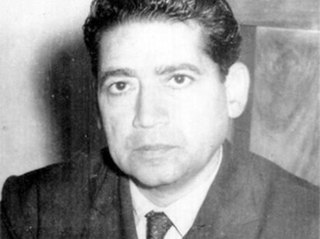Related Research Articles

Noor Jehan was a Pakistani playback singer and actress who worked in both British India and later in Pakistan's cinema. Her career lasted over six decades, during which she recorded 10,000 songs. Jehan had proficiency in Hindustani classical music, as well as in other genres such as Punjabi and Sindhi. She made her directorial debut with the film Chann Wey in 1951, becoming the first female film director in Pakistan. She is recognized for her contributions to music in the Indian subcontinent, particularly in Pakistan. She was given the title of Malika-e-Tarannum in Pakistan.
Syed Shaukat Hussain Rizvi was a Pakistani actor, film producer and director. He is widely considered as a pioneer of the Pakistani film industry.
Ghulam Haider (1908 – 9 November 1953; also known by the honorary title Master Ghulam Haider) was a Pakistani music composer who worked both in India and later in Pakistan after its independence in 1947.
Nazar Mohammad was a Pakistani cricketer who played in five Test matches in 1952. He was educated at Islamia College, Lahore.
Zil-e-Huma was a Pakistani singer and daughter of Noor Jehan.

Jugnu (transl. Firefly) is a 1947 Indian musical romantic comedy film directed and produced by Shaukat Hussain Rizvi. The film stars Dilip Kumar and Noor Jehan in lead roles with Ghulam Mohammad, Jillo, Latika, and Shashikala in supporting roles. It also features a cameo appearance by Mohammed Rafi. It revolves around Suraj, the son of a rich landlord, and Jugnu, an orphan, who fall in love with each other.
Chiragh Deen, known by his pen name Ustad Daman or Daman, was a Pakistani Punjabi-language poet, writer, mystic and a politician. He was active in politics after the establishment of Pakistan but continued his poetic career and till this day is revered as the "people's poet".
Ghulam Ahmed Chishti, , (17 August 1905 – 25 December 1994) was a Pakistani music composer, attributed as being one of the founders of Indian and Pakistani film music. He is also sometimes referred to as Baba Chishti.
Dost is a 1944 Bollywood film produced under the banner Navin Pictures, directed by Shaukat Hussain Rizvi.

Khandaan (transl. Family), also spelled as Khan Daan, is a 1942 muslim social Bollywood film directed by Shaukat Hussain Rizvi and produced by D.M. Pancholi, starring Pran, Noor Jehan, Ghulam Mohammed and M. Ajmal.
Naukar is a 1943 Indian Bollywood film directed by Shaukat Hussain Rizvi and starring Chandra Mohan, Noor Jehan and Shobhna Samarth. It was the fifth-highest-grossing Indian film of 1943.

Nooran, also spelled Nooraan, is a 1957 Pakistani Punjabi-language musical romance film directed by M. A. Khan and starring Noor Jehan and Sudhir in lead roles. Hazeen Qadri wrote the film, songs lyrics and dialogues of the film. The film revolves around Nooran and Sohna Baloch who falls for each other first sight but their families are enemies of each other for many years. Although, the film didn't well at box office but over the years, the film's song became popular and inspired the others, especially that sung by Jehan.

Master Abdullah, was a Pakistani film music composer. He is known for his music in movies like, "Badla" (1968), "Commander" (1968), "Ziddi" (1973), and "Sheeshay Ka Ghar" (1978).

Bibbo was a music composer, singer and actress who worked in both Indian and Pakistani films. She acted in Indian cinema from 1931 to 1947 before moving to Pakistan, following Partition of India in 1947. She started her acting career with Ajanta Cinetone Ltd. in 1933, working with directors like M. D. Bhavnani and A. P. Kapoor. She was one of the top leading ladies of the 1930s along with actresses like Devika Rani, Durga Khote, Sulochana, Mehtab, Shanta Apte, Sabita Devi, Leela Desai and Naseem Banu. She was referred to as "one of the most important female stars of the 1930s and 1940s". Her fame had her featured in the lyrics of a popular song from the film Gharib Ke Lal (1939) sung by Mirza Musharraf and Kamla Karnataki, with music by Sagheer Asif and lyrics by Rafi Kashmiri. "Tujhe Bibbo Kahoon Ke Sulochana", where Sulochana referred to another popular actress of the time. This was the first time a song featuring famous actors was used in the lyrics of a film song.
Athra Puttar is a 1981 Pakistani Punjabi-language action comedy musical film, directed by Altaf Hussain and produced by Chaudhry Mohammad Arif. The film stars Sultan Rahi, Mustafa Qureshi, Aasia, Ali Ejaz, Nanha and Bazigha.

Feroz Nizami, was a Pakistani film score composer, music director and classical singer.
Safdar Hussain was a Pakistani musician who composed playback melodies for Urdu and Punjabi Lollywood films in the decades from 1950s to 1980s.

Dopatta is a Pakistani Urdu language film released on 28 March 1952. Produced by M Akbar Khan
Saleem Iqbal was a Pakistani film music composers duo.

Chanway or Chan Wey is a 1951 Pakistani Punjabi-language film directed Noor Jehan with the supervision of Shaukat Hussain Rizvi.
References
- 1 2 "Lollywood – The Formative Period (1948 – 1955)". Cineplot.com website. 24 April 2010. Archived from the original on 1 October 2011. Retrieved 9 February 2023.
- ↑ Shahnoor Studios, Lahore on GoogleBooks website Retrieved 13 May 2020
- ↑ "Filmography of Shaukat Hussain Rizvi". Complete Index To World Film (CITWF) website. Archived from the original on 3 September 2017. Retrieved 9 February 2023.
- ↑ "Film 'Naukar' (1943)". Complete Index To World Film (CITWF) website. Archived from the original on 2 April 2016. Retrieved 9 February 2023.
- ↑ "Zeenat (1945 film)". Complete Index To World Film (CITWF) website. Archived from the original on 3 April 2016. Retrieved 10 February 2023.
- ↑ "Film 'Jugnu' (1947)". Complete Index To World Film (CITWF) website. Archived from the original on 18 April 2018. Retrieved 10 February 2023.